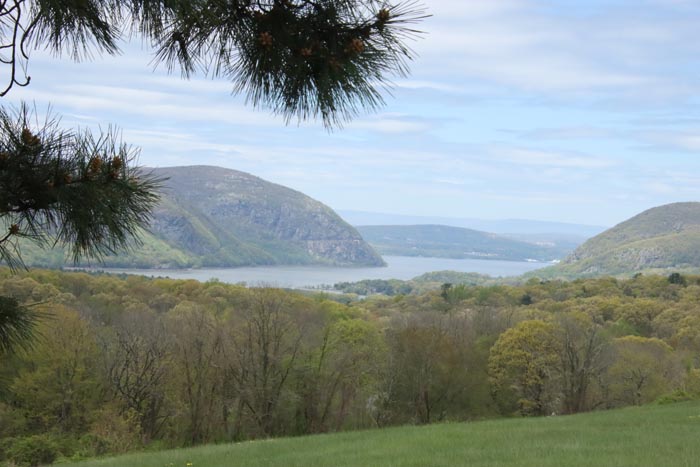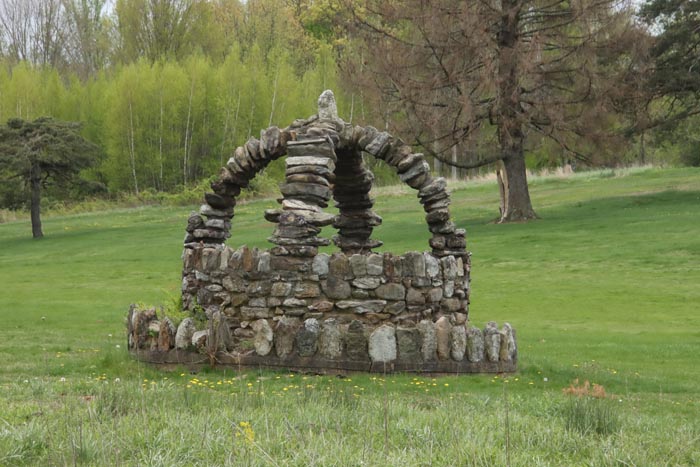
Hudson Valley Shakespeare Festival’s first season at new Garrison site opens July 7

For a decade now, I’ve been raving about the Hudson Valley Shakespeare Festival. The artistic excellence of its productions rivals that of Manhattan’s Public Theater on a more modest budget. We admire the audacity of its sometimes-edgy interpretations of the Bard and other classic stageworks, its willingness to take risks, its prioritizing of great acting and directing over extravagant sets and costumes, its trust in the audience’s capacity to imagine.
We always have to mention the setting as well. There’s little need for stagey spectacle when the backdrop is a million-dollar view of the Hudson Highlands. No one who has ever seen a play in the HVSF tent on the grounds of Boscobel is likely ever to forget that moment when the cast first appears over the rise, with West Point, Constitution Marsh, and perhaps a setting sun backlighting them.
Boscobel has been HVSF’s home since 1988, its second year of existence. But it was always only a rental – one that had to wrap up by Labor Day weekend so that the estate could be devoted to its other main role as an autumnal wedding venue.
The time to renew HVSF’s lease was approaching when an extraordinary opportunity dropped into the not-for-profit arts organization’s lap. It was the offer of a donated permanent home of its own, Now the first season of live performance at HVSF’s new home – the former Garrison Golf Course, less than four miles away from Boscobel – is about to get under way. Happily, the vista from the site is every bit as eye-popping as the old one was.

“Nobody knows this view here except for golfers,” said HVSF artistic director Davis McCallum as he gave a tour of the new site in May. Before us, as we stood where a new, permanent theater tent will be erected in 2023 or 2024, stretched a stunning northerly view of the iconic gap where the Hudson River flows through the Highlands, with Storm King on the left and Breakneck Ridge on the right. The tent opening behind the stage area will point at Breakneck, and there’s a little knoll that can be used in the same way as the topography of the Boscobel site was used to shield the cast from view until the viewer is ready for the dramatic, “otherworldly” entrance.
“We’re going to maintain that signature moment when the actors emerge from the landscape,” McCallum explained.
“We’re going to maintain that signature moment when the actors emerge from the landscape,” McCallum explained.
The new tent will be slightly smaller and lower than the old one, better ventilated, with broad overhangs that will provide rain protection during intermissions. It will require fewer masts to stay up, meaning that there will no longer be any seating with obstructed views. In other respects, it will resemble its predecessor, with a three-quarter-thrust stage, a sandy floor, and “a real sense of acoustical intimacy between the audience and the performers.”
The space will remain the sort of informal setting that nurtures the spontaneity of open-air summer theater – what McCallum calls “the opposite of museum Shakespeare.”
Since the plans for the redevelopment of this site are still working their way through the permitting process with Philipstown’s planning board, the 2022 theater season is proceeding under the auspices of a special-event permit. No new permanent construction can begin as yet.
The familiar white tent from the old site is being put up temporarily on a flat pad on a former tennis court adjacent to the golf course’s clubhouse. The grassy slope next to it is suitable for picnicking, though it’s not positioned to take full advantage of the viewshed. But the spot where the new tent will go and the three picnic lawns surrounding it are only a short walk away.
To get there from the new rain-permeable parking lot – set on a former fairway, and much closer to the action than the lots at Boscobel – visitors will be walking on gently winding, ADA-accessible pathways through a native wildflower meadow. Land that used to be a monoculture of closely mowed lawn, treated regularly with pesticides, herbicides and fungicides, is being returned to its natural state.
“We have the ambition of being the greenest theater in America,” McCallum says. “A golf course is anything but green.”
How did this ecofriendly transformation come about? Much of the credit must go to Christopher Davis, the philanthropist who is donating 98 acres of the 200-acre golf course he owned to HVSF. Though he keeps a low public profile, declining to be interviewed for this article, Davis and his family have been a major force for environmental conservation in the Hudson Valley for decades. His grandmother, Kathryn Wasserman, was something of a legend. The daughter of a suffragette, she rode horseback across the Caucasus Mountains in Russia in the 1920s, got her Ph.D. in Geneva, and married a wealthy investor named Shelby Collum Davis who would go on to become Richard Nixon’s ambassador to Switzerland. She took up painting and kayaking in her nineties after a hip fracture forced her to give up tennis. She voted for Norman Thomas, snubbed Donald Trump, and lived to be 106. At age 100, she donated $20 million to Scenic Hudson, where her grandson was a longtime board member, to save Hudson River waterfronts from development.
Chris Davis has carried on the family’s environmentalist tradition, and still serves on the board of the Hudson Highlands Land Trust, which will manage the acreage of the former golf course that won’t belong to HVSF. That land will be under permanent conservation restrictions.

Chris Davis had bought the property in 1999 specifically to prevent it from being subdivided for condo development, and since then has operated the golf course at a loss “while he looked around for an adaptive reuse consistent with his conservation values that could be maintained as a community asset,” McCallum says. “He has been a patron of the Shakespeare Festival for many years, but his real interest is in conservation and environmentalism. He’s really motivated by wanting the experience of the Hudson Highlands being accessible to more people.”
While the new HVSF site and adjoining property won’t be a public park per se, locals will continue to be able to use its trails for passive recreation such as dogwalking and snowshoeing. No longer constrained by Boscobel’s calendar, HVSF will be able to continue performances in September and October, including matinées geared to “busloads of school kids,” according to McCallum. “It’s giving us chances to do things we could never do before.”
Access will be enhanced both for people with disabilities and those who previously lacked opportunities to enjoy live theater for socioeconomic reasons. “We’re reimagining this as a cultural campus for all of the people of the Hudson Valley to feel like what used to be a golf course is a place where they can come with their family,” McCallum says. The tent, grounds and clubhouse could host community events when not otherwise in use.
Part of the generous package that Davis has bestowed upon HVSF is ownership of the clubhouse, restaurant and events business, which hosts about 130 weddings a year. The organization will create a for-profit subsidiary to manage these businesses, whose income should serve to make the theatrical activities sustainable.
“The Holy Grail of not-for-profits,” says McCallum, his face lit with wonder. “Nothing like this has happened in non-profit theater in several generations.”

The clubhouse known as The Garrison, home to the Valley Restaurant and the World’s End Bar, will make it possible for theater patrons to have a meal on-site before a show. In recent years, HVSF has had to put up its actors in motels in Fishkill for the season. Eight lodging units upstairs in the clubhouse can be used as accommodations for visiting artists.
The building can also host winter arts residencies and trainings, and be used by community groups on weekdays when no events are happening. HVSF’s ten-year plan – not included in the site plan currently under review by the township – envisions the construction of additional artist housing, a rehearsal barn/costume shop, and a small indoor theater that would be usable year-round. “The first LEED Platinum purpose-built theater in America,” McCallum boasts.
But first things first.
For now, audiences can get their tickets for three different productions during HVSF’s first season on its new site at 2015 Route 9 in Garrison, at the intersection of Snake Hill Road. The very first show will be a production of Romeo and Juliet, directed by Gaye Taylor Upchurch, with very unconventional casting: The headstrong teenaged lovers will be portrayed by HVSF’s longest-running stage veterans Kurt Rhoads and Nance Williamson, who also happen to be married to each other. It opens on July 7 and runs through September 18, in repertory with Mr. Burns: A Post-Electric Play by Anne Washburn, with music by Michael Friedman. Davis McCallum will direct. It’s a post-apocalyptic dystopian tale told around a campfire, begun by retelling an episode from The Simpsons.
Both plays will take a two-week hiatus in mid-August to host a stop on the national tour of the Woolly Mammoth Theatre Company’s production of Where We Belong by Madeline Sayet, directed by Mei Ann Teo. It’s a solo performance by Sayet, a woman of Mohegan ancestry, exploring the relationship between Shakespeare and colonialism.
Ticket prices for all three shows range from $10 to $95. To order, or to find out more, visit https://hvshakespeare.org.

